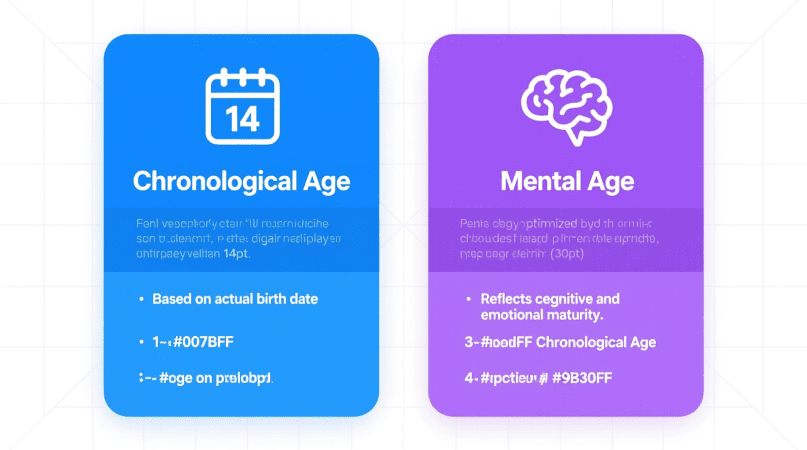
Most people know their chronological age—the number of years since they were born. But mental age tells a different story. It reflects how mature, emotionally developed, or cognitively advanced you are compared to the average person of your age group.
So what’s the real difference between the two? Let’s break it down.
- Chronological age = the years you’ve lived (your biological timeline).
- Mental age = your mindset, maturity, and emotional outlook compared to others.
Someone may be 30 years old chronologically but think and behave like a 40-year-old mentally, or the opposite—feeling more like 20 in energy and perspective.
Chronological Age
- Fixed and objective: measured from your birth date.
- Determines things like school eligibility, legal milestones, retirement age.
- Example: If you were born in 1995, your chronological age is 30 in 2025.
Understanding your chronological age helps you see how time compares to mental growth.
Mental Age
- Reflects how you process information, handle emotions, and approach life.
- Originally used in intelligence testing (Binet’s early IQ model compared performance to typical age norms).
- Unlike chronological age, mental age can shift with experiences, stress, or personal growth.
- Example: A teenager with advanced problem-solving and maturity might be said to have a mental age of 25.
If you’re unsure where you stand, take the mental age test and compare your results.
Side-by-Side Comparison
| Aspect | Chronological Age | Mental Age |
|---|---|---|
| Definition | Years since birth | Perceived maturity and cognitive outlook |
| Measurement | Calendar years | Behavior, tests, mindset, life perspective |
| Flexibility | Static, always moving forward | Dynamic, can increase or decrease |
| Focus | Biological timeline | Psychological and emotional development |
| Example | 25 years old in real years | Thinks and acts like a 35-year-old adult |
Real-Life Scenarios
- Young adult with high mental age: A 22-year-old who plans finances, avoids risks, and behaves more like someone in their 30s.
- Older adult with low mental age: A 45-year-old who thrives on fun, spontaneity, and still feels like they’re in their 20s.
- In sync: A 30-year-old who thinks and acts like a typical 30-year-old—balanced between playfulness and responsibility.
Why This Difference Matters
- Self-awareness: Helps you understand why you might feel “older” or “younger” than your peers.
- Relationships: Explains compatibility mismatches based on maturity, not just real age.
- Personal growth: Encourages reflection—maybe you need more responsibility, or maybe more playfulness.
Curious about your own results? Try the Mental Age Calculator to see how your mindset compares with your real age.
FAQs
1. Can mental age be higher or lower than chronological age?
Yes. That’s why some people are described as “mature for their age” or “young at heart.”
2. Is mental age the same as IQ?
No. IQ measures problem-solving ability, while mental age reflects overall mindset and maturity.
3. Can mental age change?
Absolutely. Stress, growth, or life changes can shift it over time.
4. Why is the difference important?
It highlights how mindset, not just biology, shapes decision-making, relationships, and personal well-being.
See how age affects your emotional strength in signs of emotional and mental maturity.
Final Thoughts
The difference between mental age and chronological age comes down to biology versus mindset. One tracks your time on Earth, the other reveals how you actually experience life. Knowing both helps you understand yourself better, improve relationships, and make choices that align with who you truly are.
- A full explanation is provided in mental age vs chronological age.
- The meaning behind different age groups is outlined in age ranges.
- How emotional growth fits into this is explained in emotional maturity.
- You can explore your own comparison using the mental age test.
- The scientific reasoning behind these differences is covered in psychology.
- More background on how scores are generated is available in our methodology.